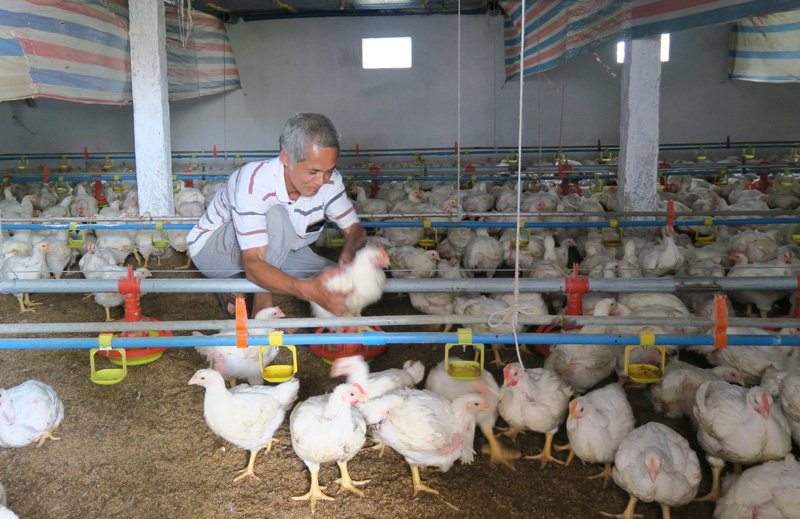
(HBO) - "Starting up my own business from 3,000 chickens, sometimes, I felt exhausted due to diseases, unstable prices, but with my determination, I have stayed well..." - Mr. Nguyen Dinh Lam, in the Village 3 / 2B, Thanh Lap Commune (Luong Son) shared this when taking us to visit the "silver billion" farm model of his family.

Mr. Nguyen Dinh Lam always maintained
thousands of chickens / litter
He planned a 3.5 hectare farm for planting
fruit trees, raising chickens, ducks, pigs, cows and fishponds.
In 2009, Mr. Lam started raising 3,000
chickens. With his careful and thoughtful care, together with the price of
chickens were up again so within a year his family has collected the interest.
With the additional capital, in 2011, Mr. Lam's family invested to expand 2
chicken farms with an area of 1,500 m2, each year raising 4 litters, each
litter obtains 10,000 chickens. He built a system of pig breeding facilities
with an area of 200 m2, to ensure the raising of 200 pigs / batch, 2 times a
year. Then, he still upgraded and repaired the ponds of 1.3 hectares for
raising fish, which made him each year collect 18 tons of commercial fish of
all kinds. The garden is grown in a variety of fruit trees, mainly bananas. The
fat and abundant banana trees, which cost less to care, each year also bring
his family the income of over 100 million VND.
When having accumulated the capital, Mr. Lam
invested in machinery to free the labor force. For example, with the task of
feeding livestock and poultry every day before, it was necessary to transport
about 60 packs of food from the warehouse to the feeders, but now, there is
only one worker standing up for operating the machine to pour the food to the
target feeders. With the help of machinery, in the past two years, Mr. Lam's
family only has to hire 4 workers. With less expenses, Mr. Lam's family gets
2.5 - 3 billion VND / year from this VAC farming model, 1 to 1.8 billion VND
after deducting all the expenses every year.
After 5 years of starting up his career with
VAC model, Mr. Nguyen Dinh Lam has become a "billionaire." He was
voted for "The Excellent Vietnamese Farmer in 2015" and the title
"For the career of developing agriculture,rural and Vietnamese
farmers".
Dao Village’s honey – a product certified with a 3-star OCOP (One Commune One Product) rating by Thong Nhat Agricultural Cooperative in Dao Village (Hoa Binh City) – is highly regarded by consumers for its quality, richness, and variety in packaging. The distinctively sweet taste of Dao Village’s honey leaves a lasting impression on anyone who has tried it.
In alignment with Project No. 07-DA/TU, issued by the Hoa Binh provincial Party Committee on November 1, 2021, Lac Thuy district has actively promoted investment and supported the sustainable development of its industrial and handicraft sectors during the 2021–2025 period. Alongside this, the district has remained committed to preserving and revitalising traditional craft villages.
Located in the northern part of Lac Thuy district, with a temperate climate and fertile soil, Phu Thanh commune has great potential and advantages in growing tea. The long-standing experience, combined with strict adherence to organic farming practices in the tea gardens, ensures that the dried tea products from Phu Thanh and Lac Thuy as a whole are sold out immediately upon production, providing a stable and prosperous life for the local people.
Amid efforts to streamline the administrative apparatus, Hoa Binh province has intensified measures to address challenges in land clearance, resettlement support, and infrastructure investment, aiming to speed up the progress of key projects.
Hoa Binh province has posted an unprecedented economic growth rate of 12.76% in the first quarter of 2025, marking its highest quarterly performance to date and positioning it as the second fastest-growing locality in the country, trailing only Bac Giang province.
Under current regulations, products in the One Commune – One Product (OCOP) programme that are rated three stars or higher must undergo re-evaluation every three months. However, in reality, some of these products fail to consistently meet the required standards, raising concerns about the sustainability of their OCOP certification. This underscores the urgent need for producers to enhance product quality and gradually develop their OCOP products into strong, marketable brands.



